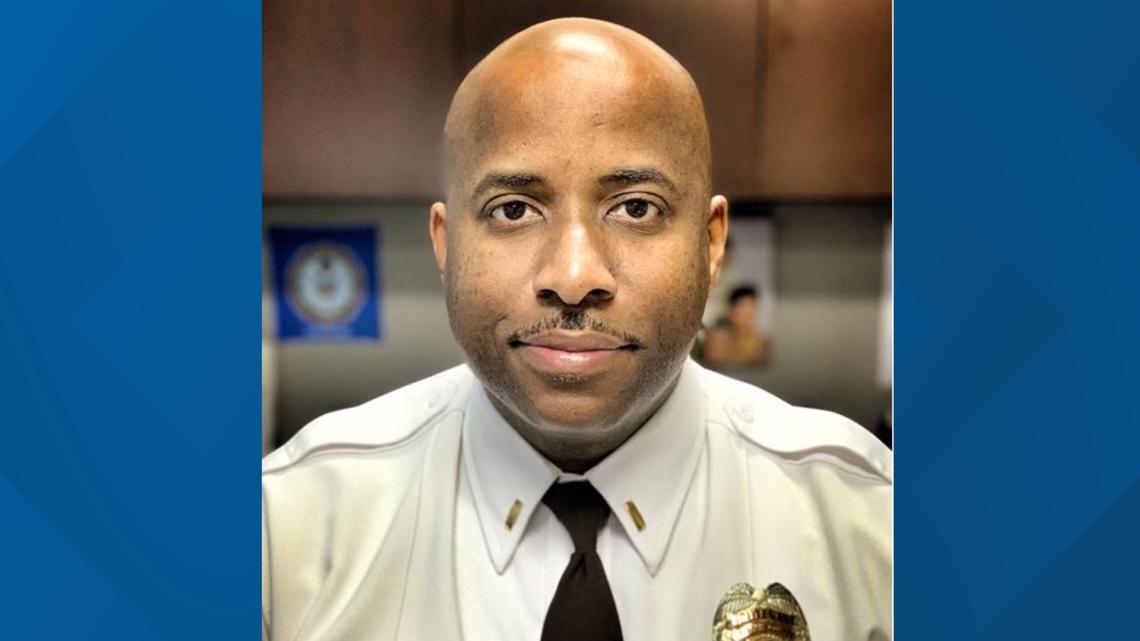ST. LOUIS COUNTY, Mo. — St. Louis County Police Chief Mary Barton’s voice cracked in December 2020 as she read the words describing the heroic efforts of a father who died saving his daughter from being shot by her estranged husband.
When she was the captain of the West County Precinct, Barton nominated John Colter for a Citizen Service Citation and awarded it to his widow during the Board of Police Commissioners meeting.
The award read, in part, “Due to the efforts of officers on the scene, the victim received lifesaving medical treatment and survived her injuries.”
One of those officers was Lt. Mike Reifschneider, according to his attorney Jill Silverstein.
“He helped get her to safety and also made sure her kids were safe and risked his life doing that,” Silverstein said.
At the same time Barton nominated Colter for the award, she nominated Reifschneider for the Distinguished Service Citation for Valor, the attorney said.
Reifschneider’s father, James Reifschneider, was killed in the line of duty after a driver struck him as he was conducting a traffic stop in 1977. He left behind his wife and three children. Mike was 14.
“When Reifschneider was there, I’m sure the thoughts of his father and what his father risked was right in his mind,” Silverstein said of her client’s actions during the shooting.
But Reifschneider wasn’t there for the board meeting.
He had a planned vacation.
Soon after, Barton visited Reifschneider at his office and handed him a chief’s commendation letter – not nearly as prestigious as the original award she nominated him for and away from any limelight, Silverstein said.
“Hiding what he did and doing it in a back room is insulting and retaliatory,” she said.


The award – or lack thereof – is now part of a complaint Reifschneider filed in June with the Equal Employment and Opportunity Commission against the department he has served for 35 years.
Barton declined to comment because the matter involves personnel or EEOC issues.
The trouble started not long after Reifschneider was named the Acting Captain of the West County Precinct – a position left vacant after Barton’s promotion to lieutenant colonel and eventually chief.
Lt. Ray Rice, who is Black, was sent to work midnights there after he filed a discrimination complaint against the department.


In Reifschneider’s complaint, he alleges his commanding officer ordered him to give Rice a performance evaluation and “make any changes you see fit,” to it, according to Silverstein.
Problem was, the only changes he could make would be to lower Rice’s scores because he had the highest rating in 29 out of 30 of the department’s categories, she said.
“He said he couldn’t do that because, ‘We all know he has a discrimination case on file,’ and he knows it would be retaliatory to lower the rating when it wasn’t warranted,” Silverstein said.
That was in August 2020.
In December, Barton promoted two lieutenants to captain. Reifschneider was not among them, even though Barton told him he would be made the permanent captain of the West County Precinct, according to his attorney.
After those promotions, Barton changed the promotion policy to require anyone who wants to become a captain to also have a Bachelor of Arts degree – something Reifschneider doesn’t have, according to Silverstein.
Now, the decision as to whether Barton’s actions were retaliatory for Reifschneider’s refusal to give Rice a lower evaluation is up to the EEOC. The commission has six months to determine whether there is probable cause for a violation and if the matter can be mediated.
The more likely outcome will end with what’s known as a right-to-sue letter.
Previous Coverage:
And, should it go to trial, this won’t be the first time the department’s top cop has been accused of using a performance evaluation to retaliate against an officer alleging discrimination.
In October 2019, then-Sgt. Keith Wildhaber argued then-Chief Jon Belmar refused to promote him because he is gay and retaliated against him after he filed a complaint.
During that trial, Capt. Juan Cox told the jury how he had lowered Wildhaber’s performance evaluation because Wildhaber was part of an internal affairs investigation.
That internal affairs investigation had not yet been completed – and, when it was, it did not find Wildhaber guilty of any policy violations for tipping off another gay officer to potential discrimination against him.
The jury obviously didn’t buy it as a legit reason to lower Wildhaber’s performance evaluation.
He won a $20 million jury verdict that was later settled for half that amount.
“On its face, changing a performance evaluation isn’t illegal, but if there’s no reason to lower a performance evaluation, and there is the indication that you should, you have to question that,” Silverstein said. “Reifschneider, being the good cop that he is like, ‘There’s no basis for me to change this.’
The way the award for his bravery was handled is what bothers Silverstein the most.
“We know these folks don’t do this work for the pay, they do it because they want to serve the community and having the community have the opportunity to thank them, it’s valuable,” she said. "And hiding what he did and the service he did for that family and the community was just a real slap in the face and retaliation for refusing to play along with the rules regarding Ray Rice.
“This is the kind of guy you want on the street. A mentor. A leader. With everything we’re going through right now, this is an example of someone you want to look up to, and living up to the legacy of his father, he knew the value of service.”



